Explore the symbolism of lucky birds for home! Discover cultural beliefs and meanings associated with fortunate birds in your household.
Introduction
Birds have held significant symbolic meanings and superstitions across various cultures and traditions throughout history. Many cultures associate certain birds with luck, prosperity, protection, or positive energies within a household. These beliefs often stem from folklore, ancient myths, or cultural symbolism surrounding specific bird species. We are going to know about how many lucky birds for home in the world exists.
Names of 14 Lucky Birds For Home
Here, we’ll explore different types of 14 birds celebrated for their associations with good fortune and positivity within homes. Each bird possesses unique characteristics, cultural significance, or superstitions that have deemed it fortunate or auspicious in different parts of the world. The following sections will delve into the distinct traits, symbolic meanings, and reasons behind why these birds are considered lucky companions in households.
1- Peacock
A. Description and Characteristics: The peacock, scientifically known as Pavo cristatus, is a mesmerizing avian species celebrated for its extravagant appearance. Its resplendent plumage, predominantly in shades of iridescent blues and greens, consists of elongated tail feathers, known as a “train,” often displayed in elaborate courtship rituals. This majestic bird, native to South Asia, stands as a symbol of beauty and magnificence.
B. Cultural or Superstitious Beliefs: The peacock holds significant symbolism across diverse cultures. In Hindu mythology, the peacock is associated with deities like Saraswati and Lakshmi, representing wisdom, fertility, and good fortune. Ancient Greeks believed that the “eyes” on the peacock feathers had the power to ward off evil. In Chinese culture, the peacock represents dignity, beauty, and immortality, signifying good luck and harmony.
C. Why Considered Lucky for Home: The peacock’s symbolism extends to being a harbinger of positivity and protection. Its majestic presence is believed to bring good luck, prosperity, and safeguard against negative energies. Displaying peacock feathers or imagery in homes is thought to invite abundance, grace, and serenity, acting as a charm against misfortune and promoting harmony within the household.

Some Key Points:
Symbolism: In Hinduism, the peacock represents compassion and benevolence, often associated with deities. In China, it symbolizes beauty and dignity, regarded as a guardian of royalty and immortality.
Cultural Significance: Peacock feathers have adorned royal headdresses, textiles, and ceremonial rituals in various cultures, signifying protection, spiritual awakening, and beauty.
Unique Aspect: The iridescence of peacock feathers stems from microscopic crystal-like structures, not pigments, creating a mesmerizing play of colors.
2 – Robin
A. Description and Characteristics: The Robin, scientifically known as Erithacus rubecula, is a small bird celebrated for its distinctive red-orange breast, which contrasts with its brownish plumage. Renowned for its melodic song and charming appearance, this bird often frequents gardens and woodlands, symbolizing joy and renewal.
B. Cultural or Superstitious Beliefs: The Robin holds a special place in folklore and traditions across various cultures. In European folklore, the Robin’s red breast is often associated with sacrifice and rebirth. It’s considered a symbol of renewal, the arrival of spring, and a messenger from departed loved ones in some beliefs.
C. Why Considered Lucky for Home: The presence of a Robin near a home is perceived as a positive omen in many cultures. Its cheerful song and vibrant appearance are thought to bring joy, happiness, and good luck. Some traditions believe that a sighting of a Robin near one’s residence signifies upcoming positive changes or the presence of departed loved ones offering protection and reassurance.
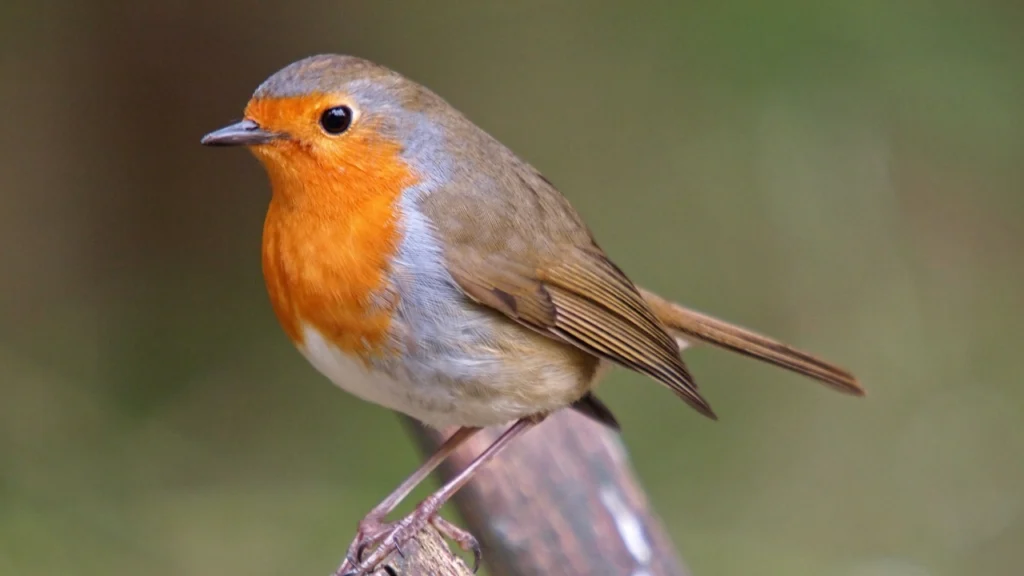
Some Key Points:
Symbolism: Beyond being a harbinger of spring, the Robin is linked to new beginnings, rejuvenation, and the renewal of life.
Cultural Significance: In Native American folklore, the Robin’s song is believed to bring healing and growth, symbolizing the cycle of life.
Unique Aspect: Robins have the ability to adapt to diverse habitats, symbolizing resilience and survival.
3 – Hummingbird
A. Description and Characteristics: The Hummingbird, known for its tiny size and remarkable agility, belongs to the family Trochilidae. These vibrant birds exhibit iridescent feathers, swift aerial movements, and a distinctive ability to hover in mid-air while sipping nectar from flowers using their specialized long bills and tongues.
B. Cultural or Superstitious Beliefs: In various cultures, the Hummingbird holds diverse symbolic meanings. Native American tribes perceive the Hummingbird as a messenger of joy, love, and harmony. In some cultures, their iridescent feathers symbolize resilience, energy, and positivity. Additionally, the Hummingbird is often associated with bringing luck and good fortune.
C. Why Considered Lucky for Home: The Hummingbird’s presence is believed to bring positivity and luck to households. Its swift and graceful movements are associated with adaptability and resilience, making it a symbol of overcoming challenges. Some believe that sighting a Hummingbird near one’s home is a sign of good luck, bringing joy, love, and positive transformations.
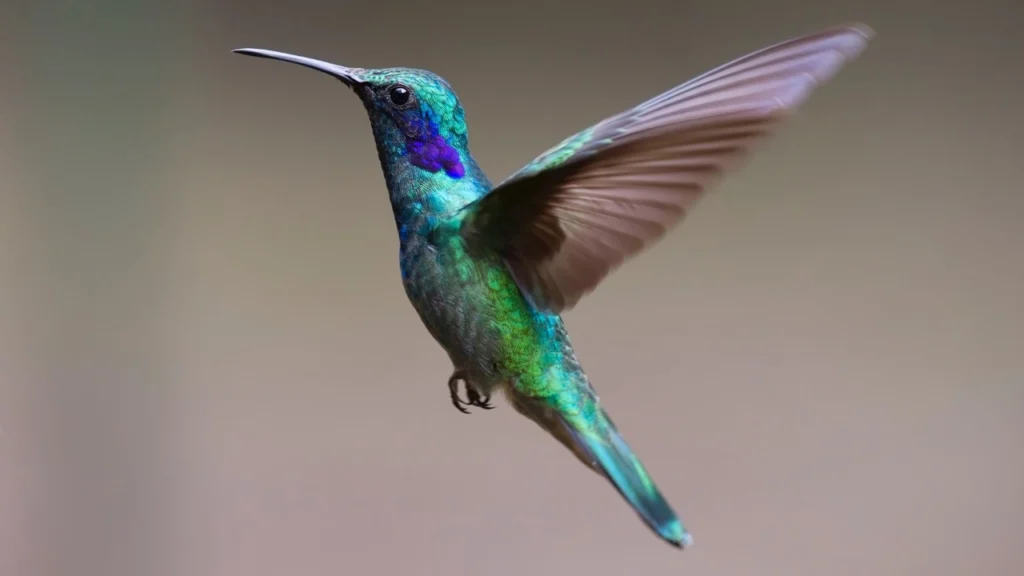
Some Key Points:
Symbolism: The Hummingbird represents joy, love, and healing. In Aztec culture, it was a symbol of war and strength.
Cultural Significance: Some Native American tribes believed that Hummingbirds carried messages between worlds, serving as spirit guides.
Unique Aspect: Hummingbirds have the highest metabolism of any bird species, allowing them to hover and fly backward.
4 – Dove
A. Description and Characteristics: The Dove, a universal symbol of peace and purity, is a gentle bird recognized for its soft cooing and graceful flight. Distinguished by its slender body, small head, and primarily white plumage, Doves are often depicted as symbols of tranquility and harmony.
B. Cultural or Superstitious Beliefs: Doves hold profound symbolic significance across cultures and religions. In Christianity, the Dove is associated with the Holy Spirit, representing purity, peace, and divine blessings. Ancient Greeks revered Doves as symbols of love and devotion linked to Aphrodite, the goddess of love. Additionally, various cultures view the Dove as a messenger of hope, harmony, and new beginnings.
C. Why Considered Lucky for Home: The presence of a Dove near a home is often perceived as a sign of positivity, peace, and blessings. Doves symbolize serenity, unity, and purity of heart. Some traditions believe that encountering a Dove near one’s residence brings messages of hope, spiritual growth, and an assurance of peaceful times ahead, making it a revered symbol of luck and harmony.
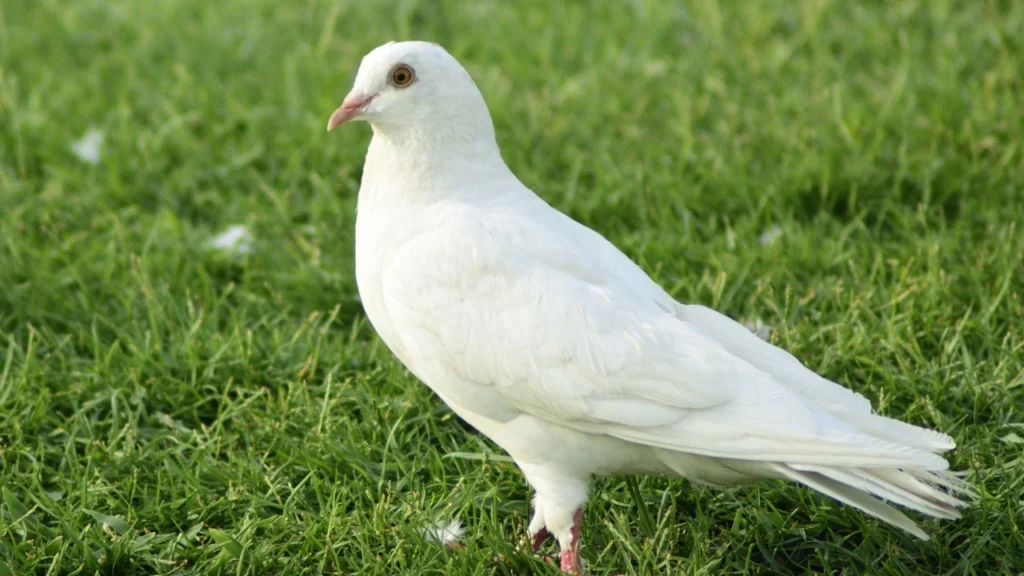
Some Key points:
Symbolism: The Dove’s white plumage symbolizes purity, innocence, and peace across various religions, including Christianity and Islam.
Cultural Significance: In ancient Greek mythology, the Dove was associated with the goddess of love, Aphrodite, representing love and devotion.
Unique Aspect: Doves mate for life, symbolizing enduring love and commitment.
5 – Swallow
A. Description and Characteristics: The Swallow, scientifically known as Hirundo rustica, is a small, migratory bird recognized for its graceful flight and distinctive forked tail. With its sleek body, pointed wings, and distinctive blue-black plumage, the Swallow is often associated with the arrival of spring and a harbinger of hope.
B. Cultural or Superstitious Beliefs: Swallows hold significant symbolism in various cultures and traditions. They’re associated with the changing seasons and the return of warmth and light. In many cultures, Swallows are regarded as symbols of hope, renewal, and the promise of better times ahead. Their annual return after winter migration signifies the triumph of life over adversity.
C. Why Considered Lucky for Home: The sight of Swallows nesting near a home is often seen as a sign of good fortune and protection. Their presence symbolizes hope, loyalty, and happiness. In some beliefs, it’s thought that Swallows bring blessings to homes, warding off negativity and bringing prosperity. Their annual return is also associated with bringing luck, happiness, and renewed energies to the household.
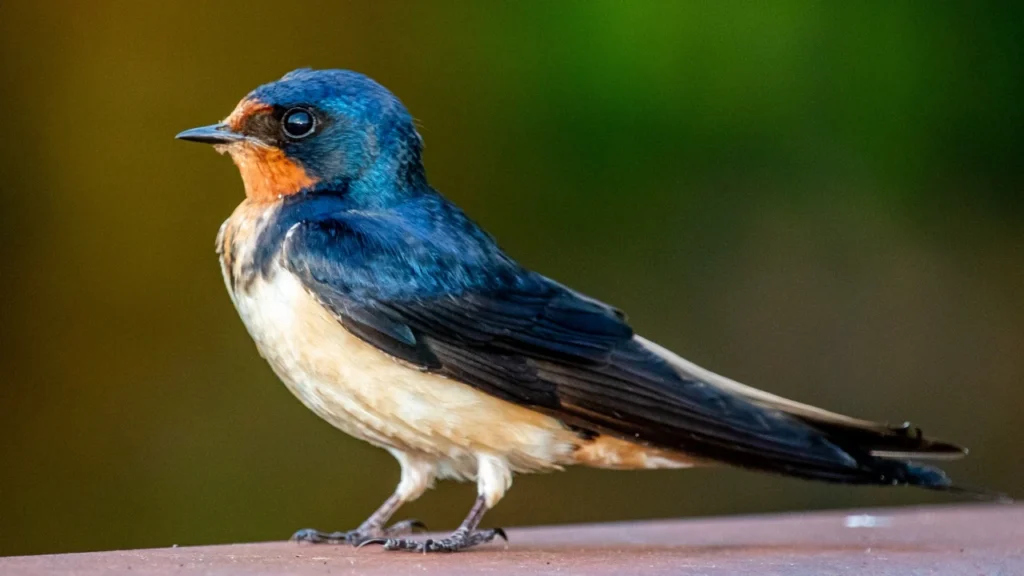
Some Key Points:
Symbolism: Swallows symbolize freedom, resilience, and the return of hope. They’re linked to the idea of homecoming and fidelity.
Cultural Significance: Sailors believed that spotting Swallows meant land was near, symbolizing the promise of a safe return.
Unique Aspect: Swallows are known for their acrobatic flight patterns, symbolizing agility and grace.
6 – Sparrow
A. Description and Characteristics: The Sparrow, a small passerine bird found across the globe, is characterized by its brown or gray plumage, compact body, and cheerful chirping. Known for its adaptability and resilience, the Sparrow often thrives in urban environments, symbolizing simplicity and perseverance.
B. Cultural or Superstitious Beliefs: Sparrows hold diverse symbolic meanings in different cultures. In folklore, they are often associated with companionship, community, and resourcefulness. In ancient Roman and Greek cultures, Sparrows symbolized companionship and joy. Additionally, Sparrows are seen as symbols of protection, love, and diligence in various traditions.
C. Why Considered Lucky for Home: The presence of Sparrows near a home is often regarded as a positive sign. Sparrows symbolize companionship, love, and diligence, and their frequent presence near dwellings is believed to bring good luck, happiness, and protection. Some believe that Sparrows nesting around homes signify security, unity, and a sense of belonging.
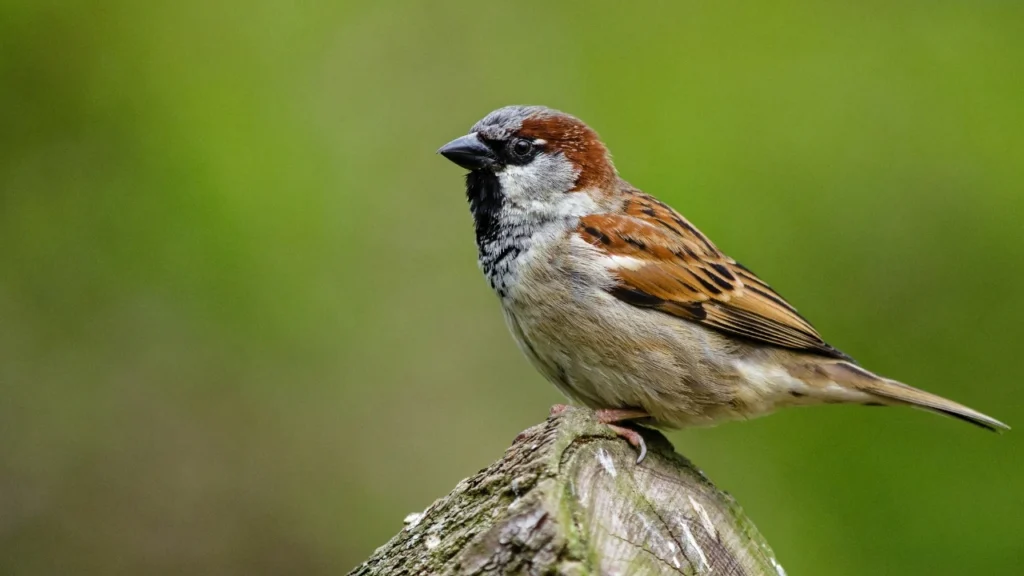
Some Key Points:
Symbolism: Sparrows symbolize community, companionship, and diligence. They’re often seen as symbols of simplicity and humility.
Cultural Significance: In ancient Rome, Sparrows were associated with Venus, the goddess of love, symbolizing happiness and companionship.
Unique Aspect: Sparrows are highly social birds, often seen in flocks, symbolizing unity and cooperation.
7 – Crane
A. Description and Characteristics: The Crane, known for its elegance and grace, is a majestic bird characterized by its long legs, neck, and distinctive calls. With its large wingspan and striking appearance, the Crane represents longevity, wisdom, and beauty in various cultures.
B. Cultural or Superstitious Beliefs: Crane symbolism spans across diverse cultures and traditions. In many Asian cultures, the Crane is revered as a symbol of longevity, wisdom, and good fortune. In Japanese folklore, the Crane is associated with luck, happiness, and eternal youth. Additionally, Cranes symbolize fidelity, good omens, and strength in several other traditions.
C. Why Considered Lucky for Home: The presence of Crane imagery or representations in homes is often regarded as auspicious. Cranes symbolize good luck, happiness, and fulfillment of wishes. In many cultures, it’s believed that displaying images of Cranes or welcoming their presence signifies blessings, longevity, and prosperity within a household.

Some Key Points:
Symbolism: Cranes symbolize longevity, fidelity, and happiness in various Asian cultures. They’re revered as symbols of good luck and prosperity.
Cultural Significance: Japanese folklore portrays Cranes as symbols of eternal youth and happiness, often featured in artworks and tales.
Unique Aspect: Cranes perform elaborate courtship dances, symbolizing grace and harmony.
8 – Magpie
A. Description and Characteristics: The Magpie, known for its striking black and white plumage, is a highly intelligent and vocal bird belonging to the crow family. Recognized for its vocal calls and remarkable adaptability, the Magpie is often associated with intelligence and resourcefulness.
B. Cultural or Superstitious Beliefs: Magpies hold diverse symbolism in various cultures. In folklore, Magpies are often associated with good fortune, intelligence, and communication. In some beliefs, the number of Magpies seen together is thought to bring different types of luck—seeing one is believed to bring sorrow, while seeing two brings joy, and three is believed to bring a marriage.
C. Why Considered Lucky for Home: The presence of Magpies near a home is seen as a positive sign in many cultures. Magpies symbolize intelligence, adaptability, and the fulfillment of wishes. In some traditions, the sight of Magpies is thought to bring good luck and joy, signifying an upcoming positive change or bringing messages from departed loved ones.
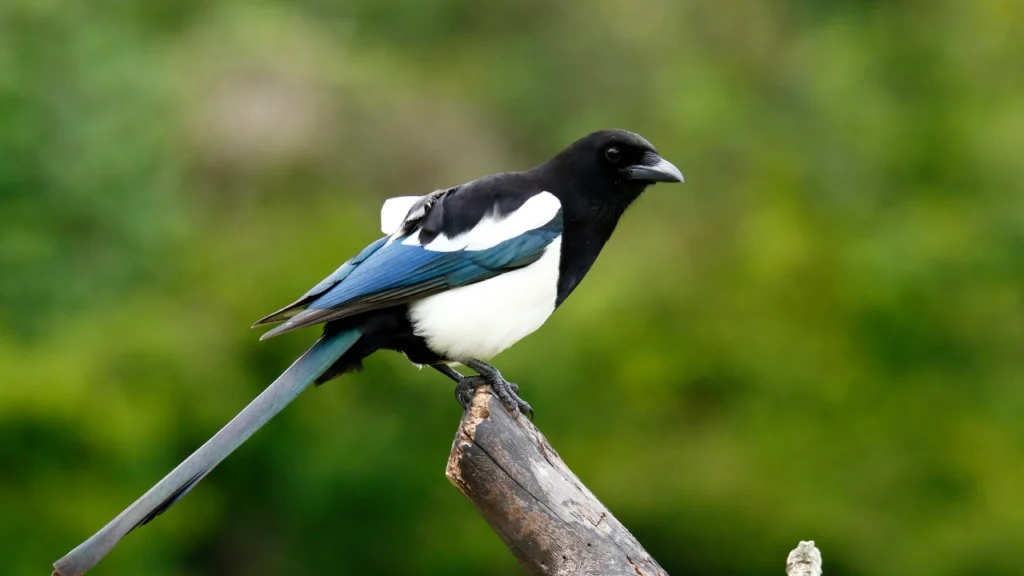
Some Key Points:
Symbolism: Magpies symbolize intelligence, adaptability, and good fortune. They’re associated with curiosity and resourcefulness.
Cultural Significance: In Chinese culture, the number of Magpies seen together is linked to different fortunes and is considered auspicious.
Unique Aspect: Magpies are known for their tendency to collect shiny objects, symbolizing attraction to beauty and wealth.
9 – Owl
A. Description and Characteristics: The Owl, known for its nocturnal nature and silent flight, is a mysterious and enigmatic bird characterized by its large eyes, sharp beak, and keen senses. With its ability to see in the dark and fly silently, the Owl embodies wisdom, intuition, and secrets.
B. Cultural or Superstitious Beliefs: Owls hold diverse symbolism across cultures and traditions. In many cultures, the Owl is associated with wisdom, foresight, and knowledge. In some traditions, Owls are believed to be guardians of the spirit world or bringers of messages from the beyond. However, in some folklore, Owls are seen as omens of bad luck or impending doom.
C. Why Considered Lucky for Home: The presence of Owl imagery or representations in homes is often regarded as a symbol of protection and wisdom. Owls symbolize intuition, insight, and guidance. In some beliefs, having an Owl figurine or depiction in a home signifies protection from negative energies and brings good luck, offering wisdom and foresight.
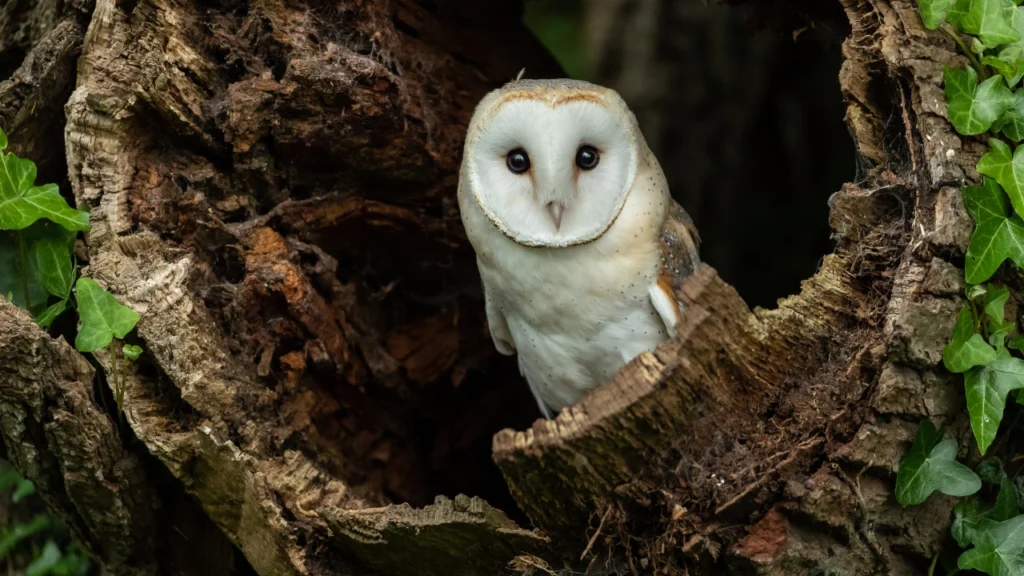
Some Key Points:
Symbolism: Owls represent wisdom, intuition, and mystery. They’re linked to ancient knowledge and foresight.
Cultural Significance: In Greek mythology, the Owl was linked to Athena, the goddess of wisdom, symbolizing protection and knowledge.
Unique Aspect: Owls have specialized feathers that enable silent flight, symbolizing stealth and wisdom.
10 – Phoenix
A. Description and Characteristics: The Phoenix is a legendary bird in mythology and folklore, often symbolizing rebirth, renewal, and immortality. While the Phoenix is a mythical creature rather than an actual bird species, it holds profound symbolism in various cultures and stories.
B. Cultural or Superstitious Beliefs: The Phoenix is typically depicted as a magnificent bird with vibrant plumage, often in shades of red, gold, and orange. According to ancient myths, the Phoenix has the remarkable ability to be consumed by fire and rise from its ashes, representing resurrection, transformation, and new beginnings.
C. Why Considered Lucky for Home: In different traditions, the Phoenix embodies themes of resilience, hope, and the cyclical nature of life. Its symbolism transcends cultures, signifying the triumph of life over adversity, making it a powerful symbol of luck, renewal, and eternal life.
While the Phoenix is not a tangible bird like the other species discussed, its symbolism and legendary attributes often associate it with luck, hope, and the promise of new beginnings.
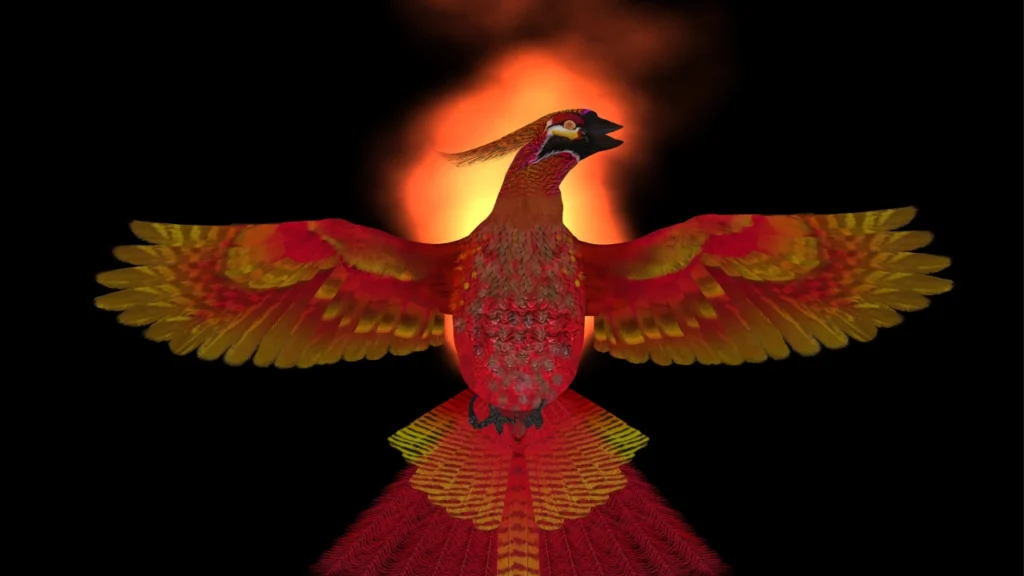
Some Key Points:
Symbolism: The Phoenix symbolizes rebirth, transformation, and immortality, representing the cycle of life and renewal.
Cultural Significance: In ancient Egyptian mythology, the Phoenix represented the sun, symbolizing resurrection and creation.
Unique Aspect: The concept of the Phoenix rising from ashes signifies hope, renewal, and the triumph of life over adversity.
11 – Bluebird
A. Description and Characteristics: The Bluebird, known for its vibrant blue plumage, belongs to the thrush family. These small to medium-sized birds exhibit striking blue feathers on their backs, wings, and tails, often contrasting with a lighter chest. They’re recognized for their melodious songs and graceful flight.
B. Symbolism and Cultural Significance:
- Happiness and Hope: Bluebirds symbolize happiness, joy, and optimism across various cultures. They’re regarded as harbingers of good fortune and positive energies.
- Renewal and New Beginnings: In Native American folklore, the Bluebird represents renewal and the arrival of spring, bringing hope and fresh beginnings.
- Messenger of Good News: Bluebirds are seen as messengers of joy and good news in many traditions, offering comfort and encouragement.
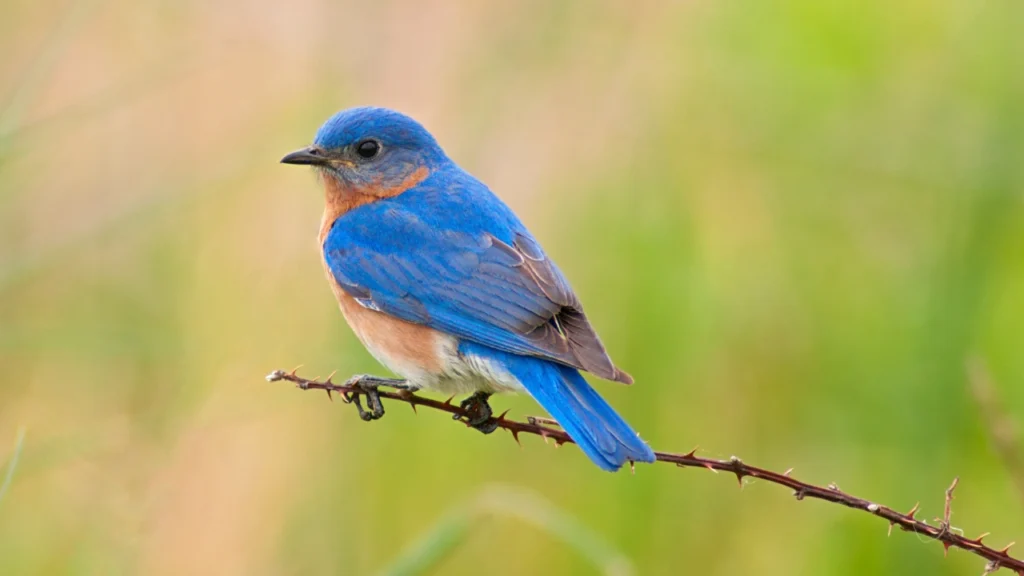
C. Unique Aspects and Characteristics: Cultural Depictions: Bluebirds have appeared in art, literature, and folklore as symbols of happiness and tranquility. They’re often depicted as symbols of beauty and grace.
Role in Ecosystem: Bluebirds play a vital role in maintaining ecological balance by controlling insect populations and aiding in pollination.
12 – Eagle
A. Description and Characteristics: Eagles are large, powerful birds of prey known for their strong beaks, hooked talons, and impressive wingspan. They’re renowned for their keen eyesight, powerful flight, and remarkable hunting abilities. With a regal appearance, Eagles often exhibit dark brown plumage with a white head and tail in adulthood.
B. Symbolism and Cultural Significance:
- Strength and Leadership: Eagles symbolize strength, courage, and leadership in various cultures worldwide. They embody power and dominance, often revered as symbols of authority and nobility.
- Spiritual Significance: In Native American traditions, Eagles hold spiritual significance, representing connection, wisdom, and spiritual guidance. They’re seen as messengers between humans and the divine.
- Freedom and Independence: Eagles symbolize freedom and independence, inspiring individuals to strive for greater heights and overcome challenges.
C. Unique Aspects and Characteristics:

- Keen Vision: Eagles possess exceptional vision, enabling them to spot prey from great distances. This attribute symbolizes foresight, clarity, and insight.
- Cultural Depictions: Throughout history, Eagles have been featured prominently in national emblems, flags, and heraldry, signifying patriotism, strength, and national pride.
13 – Hawk
A. Description and Characteristics: Hawks, birds of prey belonging to the family Accipitridae, exhibit diverse species known for their keen eyesight, agility, and sharp talons. They’re characterized by their powerful wings, hooked beaks, and swift flight. Hawks vary in size and appearance based on their species, showcasing a wide range of colors and markings.
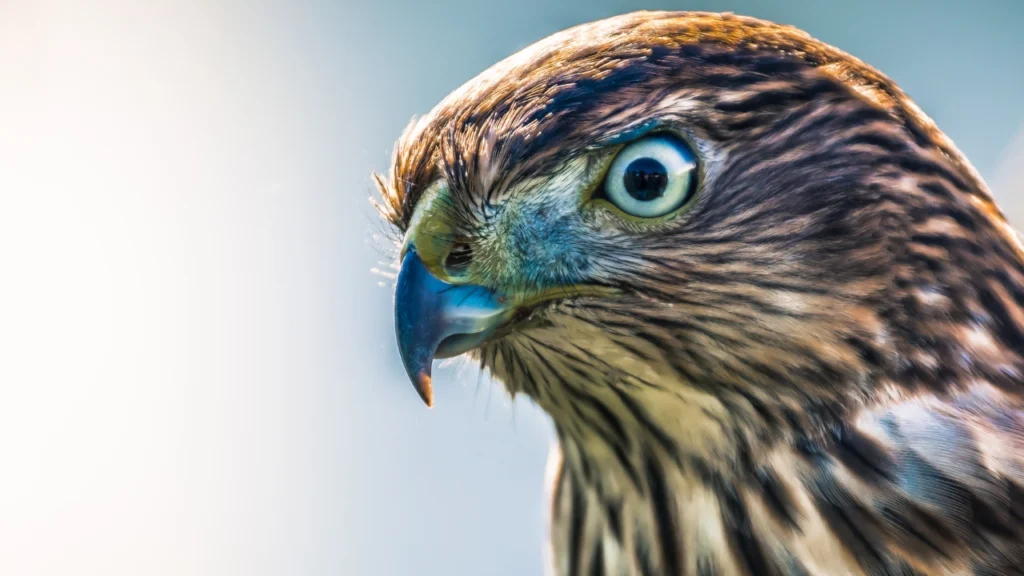
B. Symbolism and Cultural Significance:
- Focus and Clarity: Hawks symbolize focus, clarity, and vision. They’re associated with keen observation, awareness, and sharp instincts.
- Messenger of Insight: In some cultures, Hawks are seen as messengers between realms, embodying wisdom, foresight, and guidance.
- Resilience and Adaptability: Hawks symbolize adaptability and resilience, navigating diverse habitats and environments with agility.
C. Unique Aspects and Characteristics:
- Hunting Abilities: Hawks are skilled hunters, using their speed and agility to catch prey. This aspect symbolizes precision, agility, and strategy.
- Cultural Depictions: Hawks have been revered in ancient mythologies and artworks, representing strength, protection, and clarity of purpose.
14 – Cardinal
A. Description and Characteristics: Cardinals, known for their striking appearance, belong to the family Cardinalidae. These medium-sized songbirds are recognized by their brilliant red plumage, crest on their heads, and black masks around their eyes. Cardinals exhibit a melodious song and are often found in North America.
B. Symbolism and Cultural Significance:
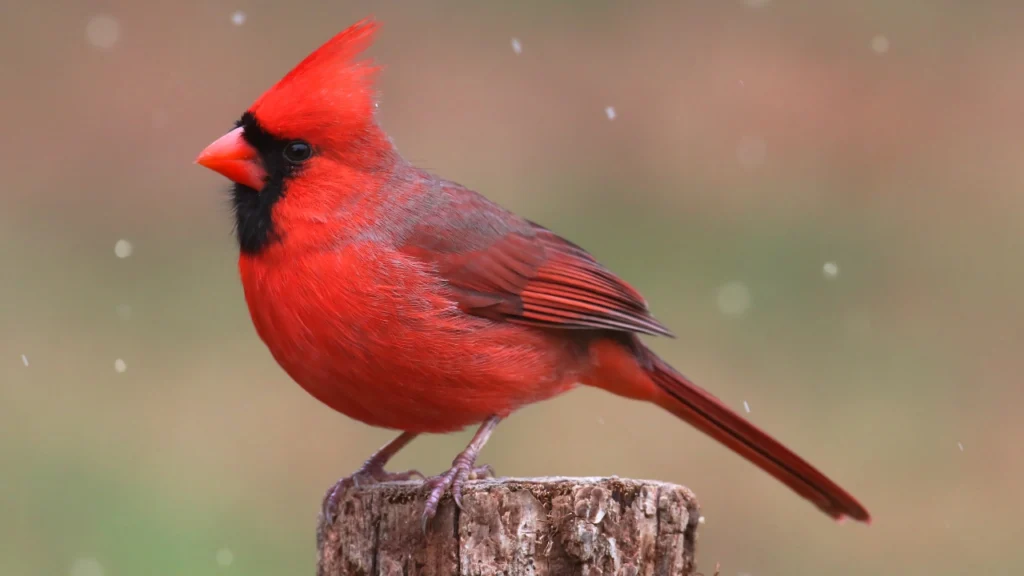
- Vitality and Passion: Cardinals symbolize vitality, passion, and energy. Their bright red plumage is associated with strength, vitality, and life force.
- Hope and Comfort: In Christianity, Cardinals are believed to bring messages from departed loved ones, providing comfort and reassurance to those grieving.
- Good Luck and Positive Vibes: Cardinals are seen as symbols of good luck and positive energies, often regarded as messengers of joy and hope.
C. Unique Aspects and Characteristics:
- Distinct Appearance: The Cardinal’s vibrant red feathers symbolize strength and vitality, standing out amidst foliage and snow.
- Mating Rituals: Cardinals are known for their strong pair bonds and melodious duets during courtship, symbolizing loyalty and partnership.
Frequently Asked Questions
Which bird is good for home as per Vastu?
In Vastu Shastra, birds hold symbolic significance. As per Vastu, placing an image or figurine of a pair of lovebirds or peacocks in the south-west direction of the home is considered auspicious. These birds symbolize love, harmony, and prosperity according to Vastu principles.
Is it good to have birds at home?
Having birds at home can be a rewarding experience for many individuals. Birds can bring joy, companionship, and a sense of nature into the household. However, it’s essential to consider factors like space, time commitment, and ensuring proper care for the birds before deciding to keep them as pets. Proper research and understanding of their needs are crucial to provide a suitable environment for pet birds.
Are birds good luck or bad luck?
Birds hold diverse symbolic meanings in different cultures and beliefs. In many cultures, birds are considered symbols of good luck, representing positivity, freedom, and happiness. However, specific beliefs about birds bringing luck or bad luck can vary significantly based on cultural traditions, folklore, and personal beliefs. For instance, some cultures associate certain birds with auspicious events or messages, while others might view particular bird sightings as omens. Ultimately, whether birds are seen as symbols of luck or bad luck depends on individual perspectives and cultural interpretations.
Is it good or bad to have bird nest at home?
Having a bird nest at home can evoke different feelings depending on personal preferences and circumstances. Some people consider it a natural and pleasant occurrence, appreciating the connection with nature and the beauty of observing birds nesting. However, others might view it as a potential inconvenience due to mess or noise, especially if it poses hygiene concerns or disturbs the living environment. It’s essential to consider individual comfort levels and any potential implications before allowing a bird nest in or around the home.
Conclusion
In exploring the symbolic significance of these 14 lucky birds for home, we’ve embarked on a fascinating journey through avian symbolism and cultural beliefs. From the vibrant hues of the Bluebird symbolizing hope to the regal strength embodied by the Eagle, and the wisdom represented by the Owl, each bird offers a unique message of positivity and fortune.
The Cardinal’s vibrant plumage signifies vitality, while the mythical Phoenix inspires hope and renewal. The Hawk symbolizes focus and clarity, while the Magpie represents intelligence and good fortune.
These birds serve as messengers of joy, symbols of strength, and bearers of good fortune, carrying narratives that transcend their avian existence. Their symbolism encourages us to embrace optimism, resilience, and grace in our lives.
May the wisdom of these birds and their cultural significance continue to inspire luck, joy, and positivity in every home they grace.

